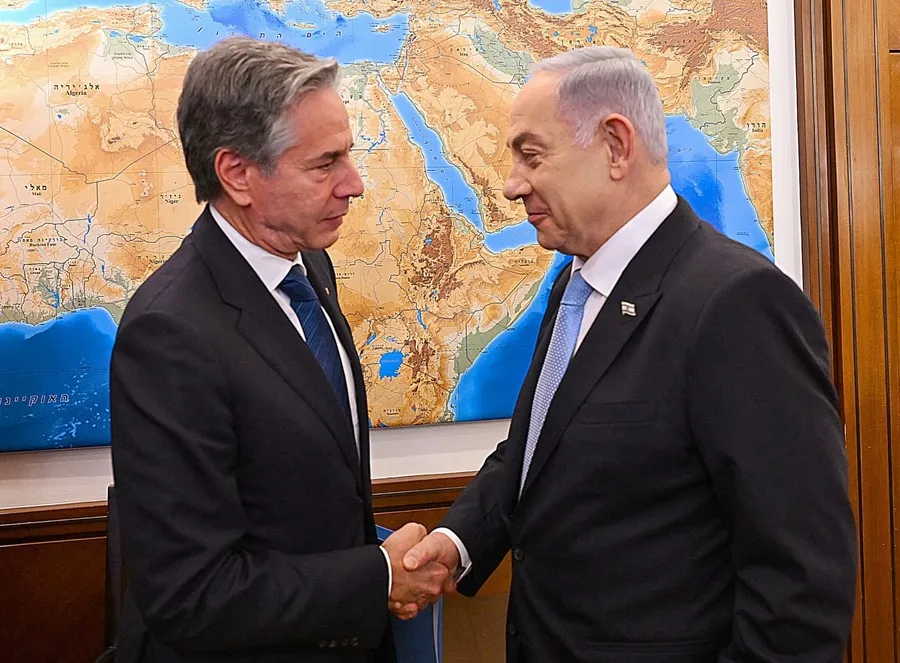International
Netanyahu tells Blinken that he remains “firm” in his demands on Hamas for a truce

Israeli Prime Minister Benjamin Netanyahu insisted on Monday to US Secretary of State Antony Blinken that he will remain “firm” in the negotiations of a ceasefire with the Islamist group Hamas so as not to give in to the “security needs of Israel.”
Netanyahu spoke for about three hours with Blinken in Jerusalem, in a meeting that “was positive and conducted in a good spirit,” according to a statement from the prime minister’s office.
The Israeli president “reiterated Israel’s commitment to the latest US proposal (ceasefire agreement) on the release of the kidnapped, which takes into account Israel’s security needs, in which he stands firm,” the statement added without giving further details.
Blinken arrived in Israel on Sunday for a ninth visit since the outbreak of the war on October 7, with the aim of promoting a ceasefire agreement that includes the release of the 111 Israeli hostages that Hamas keeps kidnapped in Gaza (of which at least 39 have died), as well as the massive entry of humanitarian aid into the devastated Strip.
Netanyahu – whom many in his own country accuse of torpedoing the negotiations with new demands and putting his political interests first – made it clear on Sunday that Israel is “negotiating, not giving in” to Hamas.
The Israeli leader urged the mediating countries – the United States, Qatar and Egypt – to put pressure on Hamas and not Israel, and reiterated his firmness on two central points: not to cease the military offensive until the Islamist group is dismantled and not to withdraw its troops from the strategic Philadelphia Corridor, which covers the entire border line between Gaza and Egypt.
Israel’s negotiating team met over the weekend with the mediators in Doha, an appointment that Hamas did not attend, demanding that, instead of new negotiations, what had already been agreed in previous months be applied based on a proposal by US President Joe Biden.
“The new proposal” that emerged after the meeting in Doha “responds to the conditions imposed by Netanyahu and is consistent with them,” Hamas lamented on Sunday, rejecting what was agreed in Qatar.
The Islamist group criticizes that the new proposal does not include a definitive ceasefire or the integral withdrawal of Israeli troops from the Gaza Strip, and that it agrees to Netanyahu’s “insistence” that the Israeli Army continue to control the Netzarim crossing (which connects the north with the south of the Strip), the border crossing of the Gaza city of Rafah (with Egypt) and the Philadelphia Corridor.
Hamas claims to have accepted on July 2 what President Biden proposed, while Israel claims to have done the same without adding new demands, but “clarifications.”
While Washington estimates that the agreement could be reached as soon as next week, Netanyahu would have told his ministers that “the chances are not high,” according to public radio Kan.
The war broke out on October 7 of last year with a Hamas attack on Israel that left about 1,200 dead and 251 kidnapped.
Blinken, for his part, said that the latest proposed agreement for a ceasefire between Israel and Hamas may be “the last chance” to rescue the hundred Israeli hostages who still remain in the Gaza Strip.
“It is a decisive moment, probably the best and perhaps the last opportunity to return the kidnapped home, to achieve a ceasefire,” the American said at the beginning of a meeting in Tel Aviv with the Israeli president, Isaac Herzog.
The head of US diplomacy made it clear that his country wants a pact as soon as possible, and highlighted the deployment of US forces in the region to try to dissuade Iran and the Lebanese group Hizbulah from attacking Israel, which could put the negotiations at risk.
The Israeli president, for his part, thanked the United States for their support and the other mediating countries, Egypt and Qatar, for their efforts to achieve a ceasefire agreement that will allow the hostages to be released.
“There is no greater humanitarian objective, nor greater humanitarian cause than bringing back the hostages,” Herzog said.
Iran assured that it supports the negotiations between Israel and its ally Hamas to achieve a ceasefire in Gaza, despite its differences with the United States and considers that Tel Aviv does not want a truce.
Despite the negotiating momentum, the Israeli offensive in Gaza continues, and this Sunday the troops extended their operations to parts of Jan Yunis (south) and, for the first time, the town of Deir al Balah (center), where thousands of Gazans have taken refuge since the offensive against Rafah, the southernmost town in Gaza, began.
The Israeli Army continued to attack a devastated Gaza Strip in the last 24 hours, where after ten months of offensive 40,139 people have already died, according to the latest figures from the Ministry of Health of the enclave, controlled by the Islamist group Hamas.
Meanwhile, at least two people were killed on Monday by the bombing of an Israeli drone against the Houla area, in southern Lebanon, amid an increase in selective attacks by the Jewish State and renewed fears of an open war in Lebanese territory.
A 45-year-old Israeli soldier, identified by military sources as Mahmud Amaria, died on Monday morning in a drone attack in the region of western Galilee, northern Israel, perpetrated by the Lebanese Shiite militia Hizbulah.
In addition, the Israeli authorities confirmed that an explosion recorded last night in Tel Aviv, which claimed the life of the suspect who was carrying the device and injured another person, was part of a failed attempt at a terrorist attack.
The armed wing of the Islamist group Hamas claimed the act, according to a message on Telegram, which it said it had perpetrated in collaboration with the Palestinian Islamic Jihad.
International
DHS Secretary Kristi Noem’s Purse Stolen in D.C. Restaurant Heist

The purse of Kristi Noem, Secretary of the Department of Homeland Security, was stolen on Sunday night at a restaurant in Washington, D.C., Fox News Digital confirmed through several agency sources.
The handbag, taken by a white male wearing a mask, reportedly contained $3,000 in cash along with personal documents, including her passport, keys, driver’s license, and DHS badge, according to an agency spokesperson.
“Her entire family was in town, including her children and grandchildren. She was celebrating her retirement by treating them to dinner, activities, and Easter gifts,” the spokesperson added.
Crime continues to be a significant issue in the U.S. capital, particularly theft. However, violent crime reached its lowest level in 30 years last year, according to the Office of the Attorney General at the time.
International
Pope Francis: The Quiet Architect Behind the U.S.-Cuba Thaw

When then-U.S. President Barack Obama and Cuban President Raúl Castro announced the reestablishment of diplomatic relations in December 2014—after decades of hostility—there was a third figure present in both speeches: Pope Francis.
This thaw in U.S.-Cuba relations—later reversed by Donald Trump—was the result of behind-the-scenes negotiations personally encouraged by Pope Francis, who passed away on Monday at the age of 88, just over a year after becoming head of the Catholic Church.
Upon learning the news of the breakthrough, the pontiff humbly stated, “This was made possible thanks to the ambassadors and to diplomacy,” which he called “a noble, very noble job.”
In 2015, months after the announcement, Raúl Castro visited the Vatican and met with the pope. Over time, Castro developed a fondness for Francis that he never had for his predecessors, Benedict XVI and John Paul II. “If the Pope continues talking like this, sooner or later I’ll start praying again and return to the Catholic Church—and I’m not joking,” said the younger Castro, who, like his brother Fidel (1926–2016), had been educated by Jesuits—the same order to which Pope Francis belonged.
Pope Francis visited Cuba later that year. Just days before his arrival, the Cuban government announced the pardon of 3,522 common prisoners as an act of clemency.
While in Havana, the pope met with Fidel Castro, who gave him a first edition of the book Fidel and Religion by Brazilian friar and liberation theologian Frei Betto.
Criticism from the Opposition
Francis’s diplomatic approach also drew criticism from parts of the Cuban opposition. In a 2022 interview with Univision, the pope revealed he had “a human relationship” with Raúl Castro.
International
Dominican Republic Declares Three Days of Mourning for Pope Francis

Dominican Republic President Luis Abinader has declared three days of national mourning starting Tuesday following the death of Pope Francis, who passed away on Monday at the age of 88 in his residence at the Casa Santa Marta.
In an official decree, Abinader highlighted the pope’s legacy “as a global leader who promoted significant reforms within the Catholic Church and was known for his humility, openness to dialogue, and commitment to peace among nations.”
During the mourning period, the national flag will be flown at half-staff at military facilities and public buildings.
According to a statement from the Office of the Presidency, although Pope Francis never visited the Dominican Republic during his papacy, he maintained a close relationship with the country. He expressed solidarity and empathy during difficult times, including offering prayers for the victims of the recent tragedy at a Santo Domingo nightclub on April 8, which claimed 232 lives and left more than 180 injured.
-

 Central America4 days ago
Central America4 days agoNicaraguan Exiles to Mark 7th Anniversary of 2018 Protests with Global Commemorations
-

 International4 days ago
International4 days agoDominican ‘False Hero’ Arrested for Faking Role in Nightclub Collapse That Killed 231
-

 International3 days ago
International3 days agoACLU seeks emergency court order to stop venezuelan deportations under Wartime Law
-

 Central America3 days ago
Central America3 days agoUN complaint filed against Costa Rica over detention of migrant children
-

 International2 days ago
International2 days agoThousands rally nationwide against Trump’s threat to U.S. democracy
-

 Central America1 day ago
Central America1 day agoSenator Van Hollen Meets with Deported MS-13 Member in El Salvador; Trump and Bukele React
-

 International1 day ago
International1 day agoPope Francis Appears for Easter Blessing, Calls for Peace and Religious Freedom
-

 Central America3 hours ago
Central America3 hours agoCardinal Rodríguez to Attend Funeral of Pope Francis: “He Was Very Dear to Me”
-

 International2 hours ago
International2 hours agoDominican Republic Declares Three Days of Mourning for Pope Francis
-

 Central America3 hours ago
Central America3 hours agoNicaragua’s Ortega and Murillo Mourn Pope Francis, Acknowledge ‘Difficult’ Relationship
-

 International2 hours ago
International2 hours agoDHS Secretary Kristi Noem’s Purse Stolen in D.C. Restaurant Heist
-

 International2 hours ago
International2 hours agoPope Francis: The Quiet Architect Behind the U.S.-Cuba Thaw















